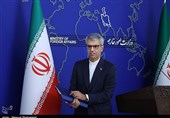China Rejects Competition with US in Bilateral Talks
TEHRAN (Tasnim) – China firmly opposes using competition to define its ties with the US, senior Chinese diplomat Yang Jiechi told US National Security Adviser Jake Sullivan in a nearly five-hour meeting in Luxembourg on Monday.x
The meeting – which both sides called "candid, in-depth and productive" – followed a May phone call between the two officials and a in-person meeting in Rome in mid-March.
Yang, who is a member of the Political Bureau of the Communist Party of China (CPC) Central Committee and director of the Office of the Foreign Affairs Commission of the CPC Central Committee, said Washington has "contained and suppressed" Beijing in "an all-round way," plunging China-US relations into "a very difficult situation" and severely damaging exchanges and cooperation in bilateral areas, Xinhua news agency reported.
The Chinese diplomat noted that US President Joe Biden has repeatedly told Chinese President Xi Jinping that the United States does not seek a new Cold War or aim to change China's system, does not oppose China through strengthening alliances, does not support "Taiwan independence," and does not seek a conflict with China.
"The Chinese side attaches high importance to these statements," he added.
Yang said the three principles proposed by President Xi – mutual respect, peaceful coexistence and win-win cooperation – are the correct approaches for China and the United States in getting along with each other, as the principles conform not only to the fundamental interests of China and the US, but also to the common aspiration of the international community.
They ought to be fundamental rules for developing China-US relations, he added. "The Chinese side is ready to work together with the US side to explore ways and methods to realize this vision."
The Chinese diplomat also said he hopes the US side corrects its strategic perceptions of China, make the right choices, and translates Biden's commitments into concrete actions, working together with the Chinese side in the same direction and concretely implementing the important consensus reached by the two heads of state.
In the meeting, Yang also stressed that China takes an "unambiguous and steadfast stand" in safeguarding its national sovereignty and territorial integrity.
China accepts no interference in its internal affairs from other countries, and any attempts to thwart or undermine China's national unity are doomed to fail, he said.
The Taiwan question concerns the political foundation of China-US relations which, unless handled properly, will have a subversive impact, Yang said. The risk does not only exist but will escalate as the United States attempts to contain China with the Taiwan question, and as the Taiwan authorities rely on the United States to seek its "independence," he warned.
The US side should not have any misjudgments or illusions, Yang said, adding that it must abide by the one-China principle and the stipulations in the three China-US joint communiques and handle the Taiwan question in a prudent and proper way.
Yang also stated China's position on issues concerning Xinjiang, Hong Kong, Tibet and the South China Sea, as well as human rights and religion. He stressed that the US ought to have benign interactions with China and make concerted efforts to promote prosperity, stability and development in the Asia-Pacific region.
Yang and Sullivan also exchanged views on international and regional issues such as Ukraine and the Korean Peninsula.
According to a White House statement, Sullivan underscored the importance of maintaining open lines of communication to manage competition between the two countries.






